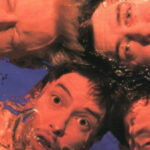 “Fish Heads,” released in 1980 by the comedy rock duo Barnes & Barnes, is one of those rare songs that has managed to maintain a cult status over the years. Its surreal, bizarre lyrics, combined with an infectious tune, make it unforgettable for those who encounter it. What might seem like a novelty song at first listen actually holds deeper layers of meaning and cultural significance. This article delves into the origins of “Fish Heads,” its journey from a local Los Angeles hit to an enduring piece of pop culture, and its impact on the music landscape.
“Fish Heads,” released in 1980 by the comedy rock duo Barnes & Barnes, is one of those rare songs that has managed to maintain a cult status over the years. Its surreal, bizarre lyrics, combined with an infectious tune, make it unforgettable for those who encounter it. What might seem like a novelty song at first listen actually holds deeper layers of meaning and cultural significance. This article delves into the origins of “Fish Heads,” its journey from a local Los Angeles hit to an enduring piece of pop culture, and its impact on the music landscape.
The Genesis of “Fish Heads”
Barnes & Barnes was the brainchild of musicians and comedy writers Bill Mumy and Robert Haimer. Both Mumy and Haimer were involved in various entertainment projects, but they found their niche in the creation of quirky, humorous songs. “Fish Heads” emerged as a product of their comedic sensibilities and was originally released on their 1980 album “Voobaha.” The song’s lyrics, which focus on a chorus of chanting, detached fish heads, were intended to be a satirical commentary on the absurdities of modern life and consumer culture.
The duo’s inspiration for “Fish Heads” came from their shared love of the surreal and the absurd. Mumy and Haimer, who were both involved in the entertainment industry, had a knack for turning the mundane into the bizarre. “Fish Heads” was not intended to be taken seriously; rather, it was a way for Barnes & Barnes to poke fun at the excesses and oddities of American culture. The song was recorded in a matter of hours, with its distinctive chant and catchy beat—elements that made it easy to remember and hard to forget.
Cultural Context and Popularity
In the late 1970s and early 1980s, American music was experiencing a wave of novelty songs and one-hit wonders. The post-disco era was marked by a blend of pop, punk, and rock influences, and many artists were exploring new ways to engage audiences. “Fish Heads” arrived at a time when listeners were becoming more open to songs that didn’t necessarily adhere to traditional pop norms. The song’s nonsensical lyrics and repetitive chorus were designed to be catchy and easy to sing along with, which contributed to its viral nature.
“Fish Heads” initially gained traction in Los Angeles, where it was played on local radio stations and became a fixture on the Dr. Demento Show—a program known for featuring novelty songs and comedy tracks. The song’s appeal lay in its sheer oddity; the chorus of fish heads chanting “Fish heads, fish heads, roly-poly fish heads, fish heads, fish heads, eat them up, yum!” was both bizarre and infectious. This simple yet strange premise made “Fish Heads” a memorable track, one that stood out in a crowded music scene.
Impact and Legacy
Despite its initial novelty status, “Fish Heads” began to gain a broader audience beyond Los Angeles. The song’s quirky nature resonated with a generation that was becoming more comfortable with irony and absurdity in entertainment. “Fish Heads” became a pop culture phenomenon, regularly appearing on television shows, movies, and even in commercials. Its legacy was cemented through its inclusion in various media, such as the soundtrack for the movie “Better Off Dead” (1985), where it became a defining moment in the film’s quirky comedy.
The song’s popularity was also helped by its infectious melody and the memorable chant that was easy to replicate. “Fish Heads” became a party anthem, often used at gatherings and events where its absurdity could be fully appreciated. The song’s humorous take on the mundane—depicting fish heads as a kind of grotesque delicacy—offered a refreshing break from more serious themes in music. It represented a form of escapism, where the listener could let go of normality and embrace the bizarre.
The Creation of a Cult Classic
Over time, “Fish Heads” transitioned from being a one-hit wonder to a cult classic. The song’s status was solidified by its inclusion in various countdowns of the weirdest songs of all time and its frequent appearances in lists of the best novelty songs. Its popularity was boosted by the rise of the internet, where the song found new audiences through viral videos and memes. The Barnes & Barnes duo became known not just for “Fish Heads,” but for their ability to create music that was as offbeat as it was catchy.
“Fish Heads” can be seen as a precursor to later novelty hits, such as “Macarena” and “Chicken Dance,” which similarly capitalized on simple, repetitive lyrics and catchy tunes. What sets “Fish Heads” apart is its intentional strangeness—a deliberate choice to distance itself from mainstream music while still achieving widespread recognition. This intentional oddness is what has kept the song relevant decades after its release. It has become a cultural reference point, a song that is often played at events where participants can indulge in a shared sense of the bizarre.
The Influence on Comedy and Music
“Fish Heads” is not just a song; it’s a cultural artifact that reflects the intersection of music, comedy, and satire. It highlighted the growing trend of ironic detachment in popular culture during the 1980s, where artists and audiences were becoming more comfortable with songs that didn’t take themselves too seriously. The song’s impact on music and comedy was significant; it influenced a new generation of artists who were comfortable blending humor with music—ranging from Weird Al Yankovic to artists like Tenacious D.
The song’s enduring appeal lies in its ability to capture the imagination through sheer absurdity. It showed that music didn’t always have to conform to expectations; it could be an outlet for creativity and silliness. “Fish Heads” became a blueprint for how to use music as a tool for satire, parody, and social commentary. The song’s simplistic lyrics and repetitive nature made it easy to parody and mimic, further embedding it in the cultural landscape.
Conclusion
“Fish Heads” by Barnes & Barnes is more than just a quirky song; it’s a commentary on American culture, a reflection of the absurdity that can be found in everyday life. The song’s success was built on its ability to be memorable—its simple lyrics, catchy chorus, and humorous take on consumer culture made it an instant hit with audiences looking for something different. Today, “Fish Heads” stands as a testament to the power of novelty songs and their ability to transcend their original context to become enduring pieces of pop culture. For Barnes & Barnes, it was not just a hit; it was a stroke of comedic genius that continues to entertain and amuse listeners decades after its release.
This post has already been read 320 times!








